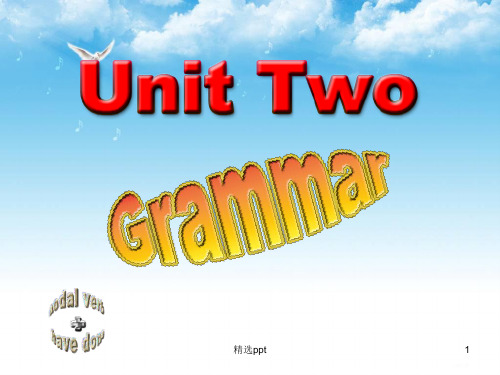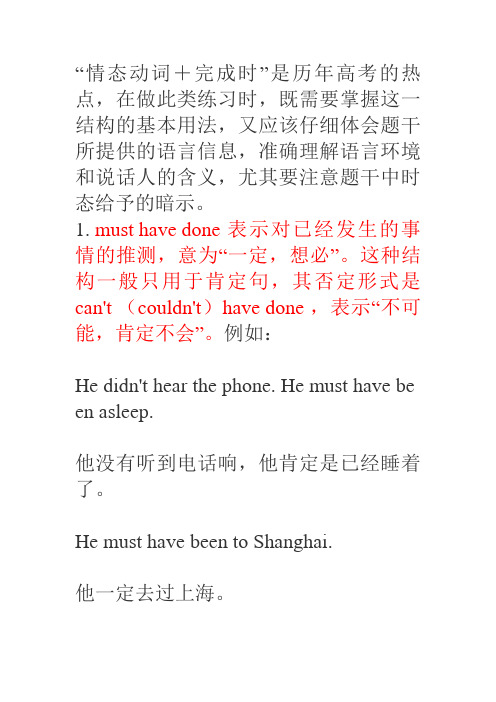情态动词完成时的推测
- 格式:ppt
- 大小:3.98 MB
- 文档页数:41

情态动词must, can, could, may,might表推测的用法:情态动词中的must, can, could, may, might都表推测。
其中must的可能性最大,can / could次之,may / might最小。
具体用法如下:1. must的用法(1)表示推测“可能性”时,意思是“一定、准是”,语气较肯定,较有把握。
He must be American. = It is certain that he is American. 他准是个美国人。
(2)must表推测只能用于肯定句。
如果要表示“一定不、肯定不”的意思时,应用can`t,如询问某种可能时,应用can。
He must know my address. 他肯定知道我的地址。
(一定)He can`t know my address. 他肯定不知道我的地址。
(一定不)Can he know my address? 他知道我的地址吗?(询问可能性)(3)must表示推测时,可以推测现在/正在发生的动作/过去发生的动作。
He must have a car now. (现在)他一定有辆小汽车。
He must be doing his exercises in the classroom.(正在进行)他一定在教室里做练习。
He must have finished the work.(过去发生)他一定已完成了工作。
注:must表示推测时很少用于将来的情况。
一般不用He must come tomorrow.可用It`s certain / I`m sure that he will come tomorrow.(4)在反意疑问句中,当附属部分含有表示推测意义的must时,疑问部分的助动词应与must后面的动词在非推测情况下的用法保持一致。
He must be a worker, isn`t he? (现在)他准时个工人,是吗?It must have rained last night, didn`t it? (过去)昨晚一定下雨了,是不是?You must have learned English for many years, haven`t you? (完成时)你一定学了好多年英语,是吗?2. can / could的用法(1)can表示推测“可能性”时,往往用于否定句或疑问句。


第五单元:情态动词表示推测的用法一,对不同时态的推测情态动词+do sth表示对现在事情的推测。
情态动词+be doing sth表示对正在发生的事情的推测。
情态动词+have done sth表示对过去或已完成的事情的推测。
如:1、They must be in the classroom now.他们现在一定在教室里。
2、The light in the teachers’ office is still on. Miss Gao must be working.老师办公室的灯还亮着,高老师肯定正在工作着。
…3、Mike may (might) hurt in the traffic accident.迈克可能在这次交通事故中受了伤。
4、He must have finished his homework yesterday.他昨天肯定完成了作业。
二、情态动词表示推测,在不同句型中的用法:1、在肯定句中,可使用的情态动词有:must, could, may, might,等;其肯定程度逐渐减弱,must表示一种很有把握的推测,意为“一定,肯定”,could/may/might表示一种不太有把握的推测,may意为“可能”,might意为“或许”could意为“可能”,could/may/might 在表示推测时,无时态区别,只表示语气差异。
如:(1)You have worked all this week .You must be tired.你辛苦工作了一周,一定累坏了。
(2)Will you please answer the phone It could /may/might be your mother.请接一下电话好吗可能是你的母亲打来的。
?(3)According to the radio ,it may/might/could rain this evening.根据广播,今晚可能下雨。

“情态动词+完成时”是历年高考的热点,在做此类练习时,既需要掌握这一结构的基本用法,又应该仔细体会题干所提供的语言信息,准确理解语言环境和说话人的含义,尤其要注意题干中时态给予的暗示。
1. must have done 表示对已经发生的事情的推测,意为“一定,想必”。
这种结构一般只用于肯定句,其否定形式是can't (couldn't)have done ,表示“不可能,肯定不会”。
例如:He didn't hear the phone. He must have be en asleep.他没有听到电话响,他肯定是已经睡着了。
He must have been to Shanghai.他一定去过上海。
They can't have gone out , because the ligh t is on .他们不可能出去,因为灯亮着。
2. can(could)have done表示对过去的时间内可能发生的事情的猜测,can have done 一般只用于否定句和疑问句。
could have done 还可以用于肯定句,常用来表示本来可能完成而实际未完成的动作。
例如:He can't have finished the work so soon.这项工作他不可能完成得这样快。
We could have walked to the station , it wa s so near .我们本来是可以走到车站去的,路很近。
3. may(might)have done 表示对已经发生的事情的不太肯定的推测,意为“可能已经,或许已经”。
例如:If we had taken the other road , we might h ave arrived earlier.如果我们选择另一条路,我们可能会到得早一些。
He might have given you more help , he w as very busy .他本来是可以给你更多帮助的,尽管他很忙。

情态动词+动词完成时,即情态动词+have+done.表示对过去的行为或动作进行推测,评论或者判断.1.must have done.表示对过去某事的肯定猜测,其否定或疑问形式都用can/could来表示。
例如:since the road is wet,it must have rained last night.2;当然对现在发生或者将来发生的事情,要用must do表示猜测,否定为can’t dohe must understand that we mean business.you must be hungry after a long walk.反意疑问句中含有Must的情况主要有以下几种:1)作为情态动词表“必须”,这时反意疑问句直接用mustn'/needn't2)当must表示推测时又分以下几种情况:a:对现在事实的推测,反意疑问句与must后面的动词呼应,如:You must be joking,aren't you ?b:对过去事实的推测,表示动作的时候用did 当助动词,表示状态时用was,如:Mr Green must have been punished for his being rude at the meeting,didn‘t he ?(格林先生一定因为昨天在会上鲁莽的行为被处罚了,是吗?)被处罚表示一个动作She must have been a policeman ,wasn't she ?(她过去一定是个警察,是吗?)是警察表示一种状态对现在情况的推测,问句部分用主动词(do,be)一般现在时的适当形式。
若是现在进行时,问句部分用现在进行时的适当形式表示。
若是there be结构,问句用isn't/aren't there。
如:1)He must be there,isn't he?2)He must have a big family,doesn't he?3)He must be waiting outside,isn't he?4)There must be some students in the room,aren't there?对已发生的过去情况的推测,若陈述句谓语部分有“must have done”,而且有表示过去的时间状语,问句部分用didn't;若没有表示过去的时间状语,问句部分用haven't或hasn't。

【导语】以下是⽆忧考整理的《“情态动词+完成式”的⽤法》,⼀起来看看吧!1)must + have done:⽤于肯定句,表⽰推测,意为“⼀定(已经)……”。
You must have finished the work. 你⼀定已经完成⼯作了。
2)can + have done:⽤于否定句或疑问句,表⽰推测,意为“可能(已经)……”。
He can’t have left so soon. 他不可能⾛得这么早。
3)could + have done:可⽤于肯定句、否定句或疑问句,表⽰推测、责备或遗憾等,意为“可能……”、“本来可以……”、“本来应该……”等。
You could have finished it, but you failed. 你本可以完成,但你失败了。
4)should [ought to] + have done:可⽤于肯定句、否定句或疑问句,表⽰责备或遗憾等,意为“本来应该……”。
You should have helped me, but you just sat and watched there.你本应该帮我的,但你只是在那坐着看。
5)need + have done:⽤于否定句或疑问句,⽤于否定时意为“本来不必”,⽤于疑问句时意为“有必要……吗”。
You needn’t have helped me because I could make it.你本没必要帮我的,我⾃⼰可以做到。
6)may + have done:⽤于肯定句或否定句,表⽰推测,意为“可能(已经)……”。
She may have seen this film. 她可能已经看过这部电影了。
7)might + have done:⽤于肯定句或否定句,表⽰推测,意为“可能(已经)……(此时might可换为 may);She may/ might have seen this film. 她可能已经看过这部电影了。
表推测的情态动词用法小结英语中有不少情态动词都可以表示推测,其语气有强有弱,表示的可能性有大有小,情态动词表推测时,可能性由弱到强的排列顺序如下:might→may→could→can→should →would→must“现将它们的用法归纳如下:1. 接近100%的可能这当然只有must才具有这么高的可能性,它的意思是“一定”“肯定”,所作出的推测几乎接近事实。
如:那帽子一定是汤姆的。
That hat must be Tom’s.He must be coming by bus. 他一定是乘公共汽车来。
2. 很有可能表示可能性较大的情态动词主要有may, should, ought to,它们大致相当于汉语的“可能”“应该”“按理会”。
如:She should [ought to] be here soon. 她应该很快就到。
We may be buying a new house. 我们可能要买一座新房子。
3. 一般性的可能在所有表示推测的情态动词中,might和could所表示的可能性最小,由于它们的语气较委婉,较不确定,所以往往相当于汉语的“可能”“也许”“说不定”等。
如:He might be waiting for you. 他可能在等你。
She might not like the idea. 她或许会不赞成这个想法。
We could all be millionaires one day. 我们有一天可能都成为百万富翁。
4. 理论上的可能性表示理论上的可能通常是用can,且可以用于肯定句中。
如:Food poisoning can cause death. 食物中毒可导致死亡。
This kind of thing can happen every now and then. 这种事情是随时可能发生的。
New England can be very hot in September. 新英格兰有时9月份很热。
“情态动词+h a v e d o n e”表推测一览表“情态动词+be doing”表推测一览表口诀:“情动”加上have done,推测事情已经干;“情动”加上be doing,推测事情在进行;条件状语从句中的虚拟语气:条件句分为真实条件句和虚拟条件句两种,真实条件句用陈述语气,虚拟条件句用虚拟语气;虚拟条件句是虚拟语气的重点虚拟条件句关键是要熟练掌握以下三大公式:1、宾语从句中的虚拟语气:有三种情况;一是在动词insist坚持,order命令,command命令,suggest建议,advise建议;Recommend建议,推荐,require要求,request请求,demand要求,desire要求,愿望,等动词后面的宾语从句中一般用虚拟语气,其结构为“主语+should+动词原形”,其中should可以省略;把以上10个动词简称为:一个“坚持”,两个“命令”,三个“建议”,四个“要求”;二是动词wish之后接宾语从句一定要用虚拟语气;从句的时态是:1、与过去事实相反用had done/had been,2、与现在事实相反用did或were,3、与将来事实相反用“would/might/could/should+动词原形”;注意:wish在简单句中并非表示的是虚拟语气,如:wish you success.祝你成功;三是在would rather的宾语从句中,也要使用虚拟语气,其从句中谓语动词的时态用一般过去时;如:I would rather you didn’t hear what I said. 我宁愿你没有听到我说的话;2、主语从句中的虚拟语气少数“it is+形容词+that+主语+should+动词原形”,其中should同样可以省略;常见形容词有:important,necessary,strange,unusual,curious,remarkable,surprising,desirable,natu ral等;3、定语从句中的虚拟语气“it ishigh/about time that+主语+动词的过去式,或者是“should+动词原形”;Time是先行词,that是引导词,其意思是“早该做什么事了”如:1、It is high time that you went to school.=it is high time that you should go to school.你该上学了;2、It is about time that you picked up your daughter at school.= It is about time that you should pick up your daughter at school.你该去学校接你女儿了;熟练掌握强调句型:句型结构是:it is/was+被强调部分+that/who+句子原有部分;在强调句型中,强调人时,一般用who,也可用that,但强调时间,地点等时只能用that,不能用when,where等;1、强调主语2、强调地点状语3、强调时间状语4、强调宾语;not …until…的三大句型:例:妈妈回家之后我才睡觉;正常 I did not go to bed until my mother come back home.强调 It was not until my mother came back home that I went to bed.倒装 Not until my mother came back home did I go to bed.怎样识别not …until…是强调句还是倒装句呢很简单,如果否定词not在句首,就是倒装句,如果it 在句首,就是强调句;it的10大句型1、It was for the first time that I wrote to a foreign pen friend.这确实是我第一次给一个外国笔友写信;这是强调句型;还原为:I wrote to a foreign pen friend for the first time.2、It is the first time that I have written to a foreign pen friend.这是我第一次给一个外国笔友写信这是定语从句,that之后的时态要用现在完成时态;3、It was eight when the class 点钟开始上课;这是时间状语从句,强调句型:It was at eight that the class began.4、It is possible that I will enter this key university.我上这所重点大学是可能的;这是主语从句;It是形式主语;that I will enter this key university是真正主语;还原成:That I will enter this key university is possible.5、It is/has been three years since he got married.他结婚成家已经三年了;It is/has been some time since sb did短暂性动词sth.意为“自从某人干某事已经有多长时间”例如:It is/has been three years since he worked here.他不在这儿工作已经三年了;6、It will be one year before she finishes middle school.再有一年时间她就中学毕业了;It is/was/ will be some time before…意为“过多长时间后再干什么”;7、It is high time we went to school.我们上学的时间到了;这时定语从句,在It ishightime that…句型中,that之后谓语动词的时态要用一般过去时或“should+动词原形”,属于虚拟语气;8、It is said that a new factory will be built nearby my hometown.据说一家新工厂将见在我家乡附近;这时主语从句;it is+过去分词+that…..;类似的句型还有:It is reported that…/ It is known that…/ It is thought that…/ It is suggested that…/ It is believed that…/ It is hoped that…等;9、It looks as if it is going to snow.看起来要下雪了;这时表语从句,类似的句型还有:It seems to sb that…/ It sohappened that…/ It appears to sb that=as if…等;10、It is necessary that we should master a foreign language.我们掌握一门外语是必需的;这是主语从句,在“It is+少数形容词+that sb should do …”这种句型中,it同样是形式主语,that之后从句的谓语动词是“should+动词原形”,其中should可以省略;这样的形容词有necessary/important/unusual/strange/natural等;情态动词+have done表推测一、must have done一定已经做了;They must have finished their work.他们一定做了他们的工作;二、1、Can have done.可能已经做了;2、Can’t have done.不可能已经做了;They can have finished /homework so quickly.他们可能很快完成他们的工作;They can’n have finished /homework so quickly.他们不可能很快完成他们的工作;They can have gone to bed /since /the door is closed.门关着,他们可能已经睡着了;完成时态+since三、1、Could have done.可能已经做过;对过去事情的推测2、Couldn’t have done. 不可能已经做过;You could have used my computer because I didn’t use it.你可能使用过我的游戏机;因为我不能使用它;you couldn’t have used my computer.你不可能使用过我的游戏机;3、Could have done表过去虚拟语气,过去表本来会做而未做;含责备,遗憾的语气;It was so fine yesterday, you could have come out for a walk.对过去的虚拟语气昨天天气好,你本来可以出来散散步的;事实上没有散步, 对过去本来会做而没有做;4、would have done.表示虚拟语气,本来完全可以做,而没有做;I would have come /to help /you with the work yesterdayto do/but I was too busy.昨天我本想帮你做工作的,但我太忙了;遗憾的语气四、should have done.表示虚拟语气,本应该做而没有做;should=ought to应该1、 Shouldn’t have done.本不应该做;事实上做了He shouldn’t have swum /in the lake /alone.他本不应该独自一人在湖里游泳;事实上已经游泳了,责备的语气2、you should have studied hard.你本来应该学习努力;事实上没有做到五、needn’t have done.表示虚拟语气;本来不必做,但做了;“多此一举”1、You needn’t have watered /the flowers.你本来不需要给花浇水;六、will /shall have done.表示将来完成时,不表示推测,也不表示虚拟;七、may have done.也许已经做了;They may have finished homework.他们也许已经完成作业;You may have read the book.他也许已经读过书;八、might have done.①也许已经做过,②本来做但未做;虚拟语气They might have won the match.他们本来可以赢得这场比赛;事实上没有赢I might have passed the exam.我本来可以通过考试;事实上没有通过虚拟语气九、needn’t have done.本来不必做但做了;虚拟语气You need not have gone out.你本来不必出去;事实上出去了十、would rather have done.过去宁愿做但未做;对过去的虚拟I would rather you paid the money yourself.我宁愿你自己付钱,AA制;I would rather not have gone /there.我宁愿没有去过哪儿;I would rather do it today.我宁愿今天做;十一、would like to have done.过去想做但未做;虚拟语气,过去的虚拟I would like to have seen /the film.我过去想看场电影;事实上没有看十二、had better have done.当时最好做了某事;You’d better have gone /there.你当时最好去哪儿;事实上没有去You had better not go dancing tonight.你最好今天晚上不去跳舞;情态动词+be going.表推测:连词other wise, or, but与with, whithout, but, if only否则但是有没有但是只要及其in case/for fear that/lest引导的从句,要用虚拟语气;以免以免免With you help, we might finish the work earlier.有你的帮助,我或许能早点完成工作; Whithout water, there would be no life.没有水,就没有生物;情态动词表推测排名次一、1、must一定,必须;语气强硬;must=have to 不得不,适用于各种时态;例句:1、It’s very late now, must you watch TVmust非要,偏要You must go=you have to go你必须走;2、must/needn’t,用must提问,用needn’t否定回答——Must I be here/at eight tomorrow morning——No ,you needn’t或者no you can’t.不,你不必3、must+be表推测,一定,一定是;You must be tired.你一定是累了;You must see her.你一定要见她;She must be playing piano.她一定是在弹钢琴;4、need/must.用need提问,肯定回答,yes ,you must.——need I do anything for you.我需要为你做任何是吗;——yes, you must / No,you needn’t是的,你一定的做;不,你不必;二、can /be able to.能够,能力;适用于现在时、过去时;表推测可能;be able to适用于各种时态,表努力实现的能力;He /has been able to /speak English since /he was a child.他自从小时候起,他就会说英语;此处be able to用于完成时,而can不能;Could表委婉的语气;Could you help me你能帮我吗三、may /might 也许,可能;表不太确定,语气较弱;——may, I come in.——No, you mustn’t /can’t / yes, you may.用may提问,否定回答;No ,you mustn’t /No can’t.May /might as well.“不妨,最好”与had better相近;You /might as well /go home now.你最好现在回家;最好四、shall /will, will用于各种人称,shall用于第一人称单复数I ,weShall用于二、三人称,表示命令,威胁,允诺,决心;Study hard and you shall get arise,said the teacher.表示允诺“努力学习你将得到奖励”老师说; 二、三人称Shall we come to see you要不要我们来看你五、should /ought to应该;Ought to表责任,义务法律Should建议、劝告1、you should study /English hard.你应该努力学习英语;应该★Should竟然You should play computer golme,你竟然玩游戏;Should she do /such a thing她竟然做这种事情How /should I know我竟然不知道Why /should you talk like that.你为什么这样说话;dare /need既是情态动词,又是实义动词;you /needn’t go /there today, need you.情态动词,反意疑问句you/need to go /there today, don’t you.行为动词,反意疑问句need to do sthHe /needs /a new computer, doesn’t he.实义动词三单He needn’t go there=he doesn’t need to go there.他不必去那里; need he go there=does he need to go there.他有必要去那里吗★dare敢I dare not go there.我不敢去那里情态动词I dare not go along.我不敢独自去;Do you dare to hare a match with us你们敢和我们比赛吗.dare to do sth实义动词★used to,用于过去时;表对比,表现在和过去;There used to be a middle school here.这里曾有一所中学;I used to go to school by bus, but now I take my bike.used to do sth实义动词used you to go to school by bike★did you use to go to school by bike.你过去去学校骑自行车吗The boy is no longer what she used to be.这个男孩与过去不一样了;对比Would /will, would表主观意见和愿望;“愿意”I would like some tea.我要点儿茶;情态动词I would like to see you.我想见你;Would表请求、愿望、个人想法;I could do so if I would.要是我愿意;I would.情态+动原六、would表推测“大概、也许”He would be the best man for the job.他也许是这个工作的最佳选;情态+动原七、would hare+done表示与过去事实相反的情况,虚拟语气;I would hare done it if I were you.如果我是你,我会做这件事;。
“情态动词+h a v e d o n e”表推测一览表“情态动词+have done”表推测一览表“情态动词+be doing”表推测一览表口诀:“情动”加上have done,推测事情已经干;“情动”加上be doing,推测事情在进行;情态动词+have done表推测一、must have done一定已经做了。
They must have finished their work.他们一定做了他们的工作。
二、1、Can have done.可能已经做了。
2、Can’t have done.不可能已经做了。
They can have finished /homework so quickly.他们可能很快完成他们的工作。
They can’n have finished /homework so quickly.他们不可能很快完成他们的工作。
They can have gone to bed /since /the door is closed.门关着,他们可能已经睡着了。
完成时态+since三、1、Could have done.可能已经做过。
(对过去事情的推测)2、Couldn’t have done. 不可能已经做过。
You could have used my computer because I didn’t use it.你可能使用过我的游戏机。
因为我不能使用它。
you couldn’t have used my computer.你不可能使用过我的游戏机。
3、Could have done表过去虚拟语气,过去表本来会做而未做。
含责备,遗憾的语气。
It was so fine yesterday, you could have come out for a walk.(对过去的虚拟语气)昨天天气好,你本来可以出来散散步的。
(事实上没有散步,对过去本来会做而没有做。
)4、would have done.表示虚拟语气,本来完全可以做,而没有做。
情态动词加现在完成时的用法情态动词加现在完成时的用法主要用于表示对过去情况的推测或虚拟语气。
以下是常见的几个情态动词与现在完成时搭配的用法:
1. Must + have done:
用于肯定句中,表示对过去情况的强烈肯定推测,意为“一定(已经)……”。
2. Can / Could + have done:
用于否定句和疑问句中,表示对过去情况的可能性推测,意为“可能(已经)……”。
在疑问句中可以用来询问过去是否有可能做某事。
3. May / Might + have done:
表示对过去情况的较弱推测,意为“或许(已经)……”。
4. Should + have done:
表示责备或者后悔过去的某个行为没有发生,意为“本应该……但实际没做”。
也可以用于肯定句中,表达惊讶或者出乎意料的情感,意为“竟然……”。
5. Would + have done:
用于构成对过去情况的虚拟语气,如果主句是与事实相反的假设,从句使用would + have done结构。
6. Need + have done:
当need作为情态动词使用时,其现在完成时形式是"needn't have done",表示过去做了不必要的事情。
当need作为实义动词使用时,其现在完成时的形式如"I haven't needed to do that.",表示到现在为止不需要做某事。
7. Used to + have done:
表示过去习惯性的动作,现在已经不再如此。